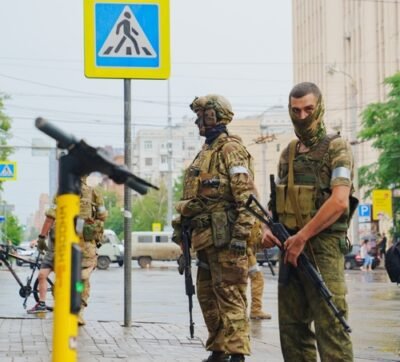Belgium, (Brussels Morning Newspaper) Private contracting of military functions has been on the rise since the first Gulf War (1991). With the collapse of the USSR, the militaries of the main Western protagonists, the USA and the UK, have been drastically scaled back, a process is known as the “peace dividend”. At the same time, economists and politicians throughout the world embarked on an ambitious plan involving the privatization of state-owned firms and functions. Inevitably, the two fads coalesced and huge chunks of hitherto state-monopolized warfare were contracted out, outsourced, and even offshored.
Third World countries have always leveraged mercenaries to subdue adversaries at home and abroad. Many armies in Africa and Asia and even in certain parts of Europe (such as the Balkans) were or are being run by third-party contractors who sometimes also actively participate in the fighting.
As far as the USA and UK are concerned, until the Iraq war, private contractors were mainly responsible for logistics, training, and security tasks. This narrow definition of their roles is in flux, though. Private soldiers of fortune may yet be hired and rented out even by the governments of the West, though I regard this as extremely unlikely.
Oddly, PMCs had a limited role in the Global War on Terror (GWT). Granted, private military companies are involved in the provision of logistical, training, and security support to forces on the ground and they also collaborate with field agents of secret services (such as the CIA). But, asymmetrical warfare is still carried out largely by regular armies, backed by intelligence gathered by state-run agencies.

Actual combat is not being transformed by the influx of private contractors. We are simply reverting to earlier times and models when war was a public-private partnership and military camps incorporated entrepreneurial suppliers, contractors, service providers, and hangers-on. The attempt to render modern armies self-sufficient and self-sustaining has clearly failed.
Lean, technology-rich armies are an inevitable outcome of budgetary constraints and ever-more sophisticated gadgetry. The Transformation program is a response to these trends, not to the changing face of war. Truth be told, the USA has always faced low-intensity asymmetrical warfare. It rarely found itself engaged in conventional battles, mainly in the European theatre.

Private contractors merely substitute for existing structures. Their functions are not always low-skilled, quite the contrary. Moreover, the army duplicates the functions of private contractors. This redundancy may appear wasteful but it stems from the deep and justified distrust professional soldiers hold towards civilian contractors.
Quantitatively, PMCs will get more involved in future wars, but not qualitatively. PMCs and private contractors will grow in number, stature, and contribution to the war effort. But they are unlikely to replace the professional soldier in actual combat or the field agent in HUMINT. Their functions will remain largely limited to logistical support and training.
Private contractors are not GIs. They provide no substitute for the fighting men and women of the armed services. I doubt if they ever will. Thus, they do not alter the military equation in any meaningful way. Their involvement has no bearing on whether to draft and mobilize fighting-age conscripts.
Incredibly, there are no serious studies that decide the question of whether private contracting is a clever move, from the pecuniary point of view. Anecdotal evidence suggests that it is not and that waste and corruption are as rife there as among the traditional state bureaucracy.
Chain of command issues is inevitable. This is especially true when contractors are granted immunity to the consequences of their delinquency, crime, waste, and venality. There is no love lost between the fighting corps and private contractors. As we have seen in Iraq, the involvement of PMCs is often resented by host governments and leads to diplomatic and other incidents.
The solution, of course, is to hold private contractors accountable for their actions and misdeeds.
The modern armies that emerged after the Crimea War are a historic aberration. With the exception of the last 150 years, armed forces throughout history were composed of professional soldiers for hire augmented by ad hoc, short-term bodies of conscripted vassals or citizenry or militias. The erstwhile fighting corpus in its camp incorporated hordes of suppliers of goods and services (“private contractors” in today’s parlance).

The attempt to render modern armies self-sufficient and self-sustaining by getting rid of these “parasites” has clearly failed. We are back to where we started: the traditional army.
It is also completely wrong to postulate that “Total War” is a modern phenomenon. It is at least as old as the Bible. The ancient Hebrews were instructed by God to eradicate their enemies, men, women, and children, and to confiscate the property of their vanquished foes. How much Total can it get?
Mankind has always cycled between geographically-limited, guerrilla-type skirmishes and all-out warfare. Top-heavy Goliath forces, armed with the latest technologies always faced pebble-slinging, nimble, “low intensity” Davids. There’s nothing new about that. We are simply in an interim period between two classical wars. Call it a respite.
Opinions expressed in the op-ed section are solely those of the individual author and do not represent the official stance of our newspaper. We believe in providing a platform for a wide range of voices and perspectives, even those that may challenge or differ from our own. As always, we remain committed to providing our readers with high-quality, fair, and balanced journalism. Thank you for your continued support.Sincerely, The Brussels Morning Team




